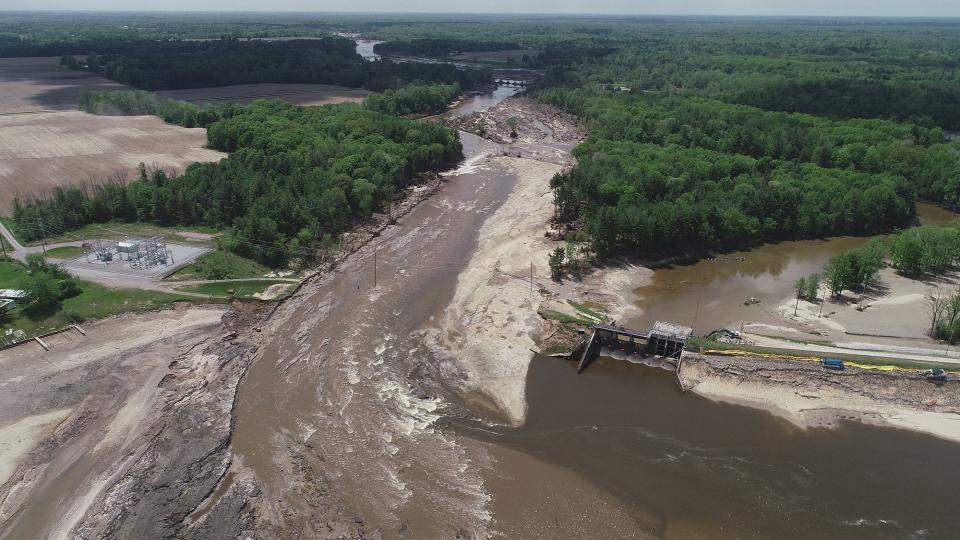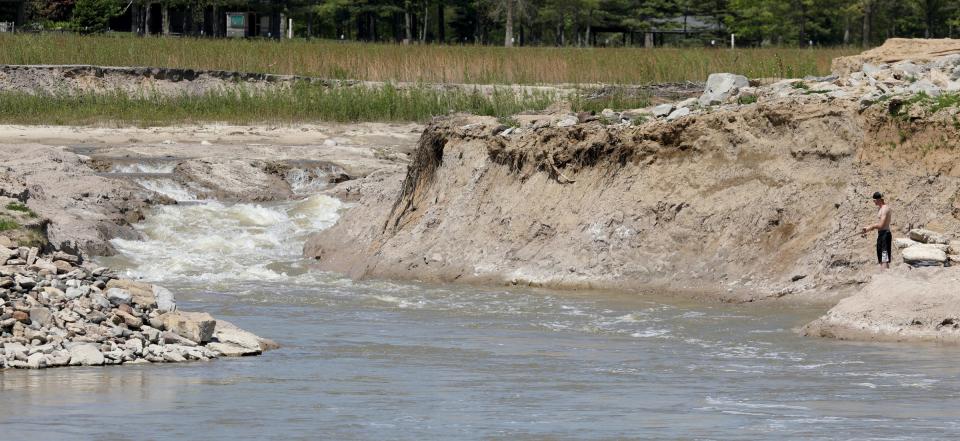Judge: Former owner of failed dams near Midland liable for $119M in environmental damage
The former owner of the Edenville Dam, which failed in record rainfall in May 2020 and caused extensive flooding around Midland, is liable for nearly $120 million in damage to area fisheries and freshwater mussel populations, a U.S. District Court judge ruled Monday.
Lee Mueller, former owner of Boyce Hydro Power LLC, was found liable for the environmental damage in a lawsuit brought against him by the Michigan departments of Natural Resources, and Environment, Great Lakes and Energy. U.S. District Judge Paul Maloney delivered the ruling as a default judgment, typically issued in favor of one party in a legal proceeding when the other party fails to appear in court or fails to take actions in the case required by the court.
The Edenville Dam is a 6,600-foot earthen embankment up to 54½ feet in height, spanning both the Tittabawassee and Tobacco rivers in Midland and Gladwin counties. The dam failed in record rainfall on May 19, 2020, causing the further failure of the downriver Sanford Dam. The resulting widespread flooding caused more than $200 million in damage and forced the evacuation of more than 10,000 people. Wixom Lake, the 2,600-acre reservoir created by the Edenville Dam, was largely emptied.

Boyce Hydro had its hydro power-generating permit revoked by the Federal Energy Regulatory Commission in September 2018, the agency citing the dam owner's repeated failure to address safety concerns at the dam — especially its ability to withstand heavy rains.
Fisheries damage runs in tens of millions
The state agencies, through state Attorney General Dana Nessel's Office, sued Mueller and related corporations to the dams in June 2020, less than one month after the dams' failures. The state alleged Mueller and his dam operations violated Michigan's Natural Resources and Environmental Protection Act, along with other claims.
The state's evidence included testimony by DNR fisheries biologist Jeff Jolley, who concluded that the "total combined economic loss of fish replacement costs and lost recreational value projected over five years, a conservative estimate of when the reservoirs might be restored, is over $21 million.”
Another report to the court from Elle Gulotty, a resource analyst for the DNR, estimated that almost 3 million mussels were killed across Wixom and Sanford lakes because of the dam failure. She estimated that replacing those mussels would cost more than $90 million.
“The dam’s ownership completely disregarded imminent threats to the safety and integrity of the dam, and as the state clearly demonstrated before the court, Lee Mueller and his business were responsible for the disaster that struck Edenville and other area communities," Nessel said in a statement.
“This nearly $120 million judgement is important both as a measure of accountability to the community Mueller devastated and as a deterrent to other owners of critical infrastructure."
'Defendants knew the Edenville dam embankment might fail'
Maloney accepted those damages and cost deficits, and added more than $8.8 million in relief stemming from violations by Mueller of the Natural Resources Environmental Protection Act, for a total of $119,825,000.
The court last May granted the state agencies' motion for summary judgment against three limited liability corporations related to Mueller and the dams, as well as three related trusts, that the defendants conceded amid bankruptcy proceedings.
Maloney, in his ruling, drew upon evidence, including Mueller's deposition testimony "that Defendants knew the Edenville dam embankment might fail." He also cited testimony by Frank Christie, a general manager and engineer for the Edenville Dam who left the job in 2017 "because of all the problems accumulating at both the Edenville and Sanford dams," Maloney stated in his ruling.

The litigating state agencies, the judge wrote, "assert that Defendants knew of the Edenville dam’s vulnerability, prepared a plan to resolve it, and then never implemented said plan. Mr. Christie testified that, in lieu of fixing the problems with the dam, Mr. Mueller engaged in several other money-making schemes like building a parking lot and pole barn, digging a pond, attempting to build a marina, attempting to build a travel trailer park, and attempting to host a music festival."
Dam owner's attorney says state escapes accountability
Lawrence Kogan, attorney for Mueller and his companies in the case, called the judge's "a hollow judgment."
"It's a judgment against bankrupt entities, an entity that doesn’t have any money, that can’t fight back," he said. "What’s the purpose?"
Kogan said the state, local governments and shoreline residents have escaped their own culpability. The state allows pesticides and herbicides to flow into Wixom Lake, and didn't do enough to control the invasive zebra and quagga mussels that consumed indigenous mussel species' food sources, he said. He noted that the state's entire dam inspection program consisted of two staff and a supervisor and a budget of less than $400,000 at the time of the dam failures.
State officials knew of the dam's unresolved safety problems, yet still allowed water levels on Wixom Lake to be raised in the rainy spring season to allow for area residents to install their docks, Kogan said.
More: A year after Midland flood: Mud, erosion, missing lakes, disrupted lives and uncertainty
"The dams were there from the 1920s," he said. "The state knew about the dams; the county knew about the dams, and raising the water level for the boaters was deemed most important."
The Four Lakes Task Force, a nonprofit made up of local residents that serves as the designated authority for Midland and Gladwin counties on the dams and lakes, is working on a multiyear plan to restore the Edenville and three other dams, and the impoundment lakes behind them, at a cost of up to $300 million. The costs will be covered by federal and state funding as well as assessments on nearby residents.
Contact Keith Matheny: kmatheny@freepress.com.
This article originally appeared on Detroit Free Press: Judge: Former owner of failed dam liable for $119M in environmental harm

